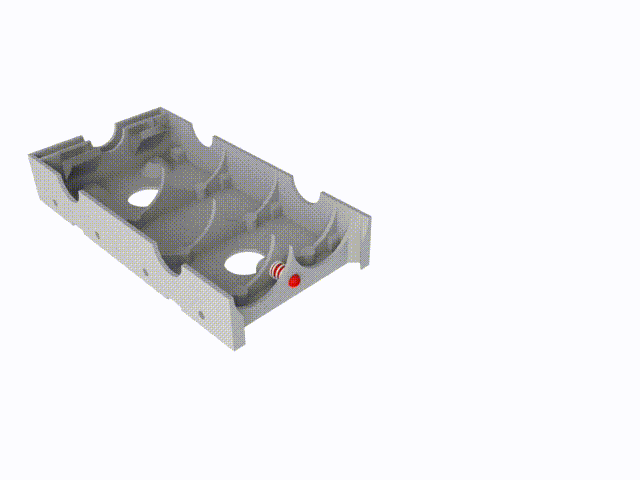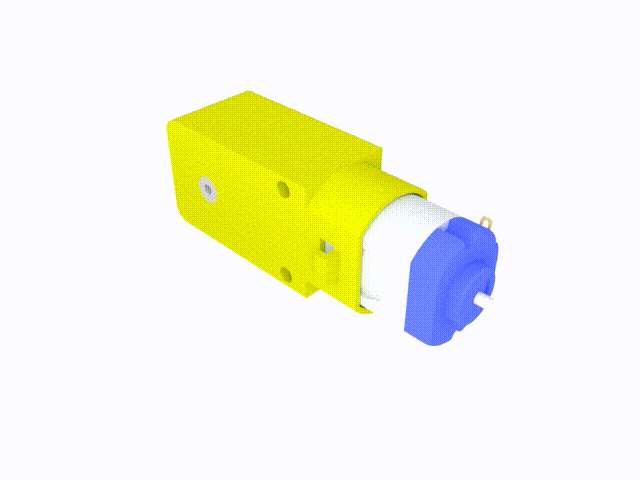In addition to the exorbitant price (exorbitant for schools and municipal centers of extracurricular activities), these designers have another drawback - they are so proprietary that the said company seeks to cut even 3D models similar to their details from the Internet ( proof ).
There are alternative developments in this area, but, unfortunately, they have not received mass distribution. For different reasons. Some are too non-universal (mBot), others cost even more than Danish cubes.
Attempts to create an interesting alternative periodically start, but somehow so far not a single one of them has “fired”. Although, for example, the "Structor" from "Amperka", IMHO, the thing is just wonderful. But he didn’t get to the circles no matter how massive, even despite
to your openness.
And now I came across an interesting project. I stumbled almost by accident, although I am very interested in designers for school circles - I myself lead such a thing (and yes, I’m using one of those same Danish designers; because it’s very difficult for the Federal State Educational Standard and something else to buy in school in Russia - only if it’s for your score).
I must say right away that everything described below is not an advertisement, but an attempt to bring to the masses a really interesting undertaking. What if this time "shoot"?
I am not the author of this project, and in general I am not connected with them at all (I acted as a sponsor on Boomstar :)).
So, I present IQBX - an electromechanical modular constructor. Next, I will briefly retell the official description of the author. The full version can be found on Boomstarter.
The IQBX designer has incorporated everything necessary for the rapid construction of a wide variety of mechanisms. It can also be combined with other well-known designers (including the well-known Danish cubes and the classic Soviet metal constructor; hello to "Structur"!). It can be either a toy or an educational function for your children.

IQBX - consists of hollow blocks (in which electronics with mechanics can be placed), as well as modules that can be connected to these blocks.
Empty structural
From empty structural blocks, you can assemble a frame to which other blocks and modules will be attached.


Battery pack
A pair of lithium batteries of industrial format 18650 is placed in the battery pack to power electromechanical blocks and electronic blocks.

Unit with electronics
It can accommodate an Arduino board, or other boards and modules.

Drive unit
A gear motor is built into the drive unit, which generates torque and drives various modules.

The main idea of the designer is its versatility and accessibility. Therefore, first of all, the blocks will include the most common DIY components on the market, such as: Arduino, SG90 servos, TT gear motors and other popular components and elements.

The author’s idea is to make a platform similar to all known in the world of radio electronics - Arduino, but for the world of mechanics, on the basis of which it will be possible to assemble various mechanisms and self-propelled chassis for creating robots, controlled cars and other electro-mechanical devices.
The next important element is the module. A module, unlike a block, can be of any shape, and any module can be attached to the block. For example, a module with a wheel can be attached to the drive unit.

By combining the same modules and blocks, you can get various crafts. Everything is limited only by your imagination. The author has already developed several basic options for crafting:
Tricycle craft
This is the simplest and cheapest wheel scheme that beginners often use to create their first robots. This craft is ideal for beginners, hobbyists and robotics clubs.

Four-wheel craft
All-wheel drive 4x4 wheel craft has great power and
better cross-country than a tricycle. It is the optimal solution in terms of simplicity and functionality. Also suitable for creating robots or just radio-controlled cars.

The size of the standard IQBX block "1x1" is (LxWxH) = 40x40x26.6 and the block "1x2" (LxWxH) = 80x40x26.6.
With these sizes, most common DIY components fit in blocks. Three blocks “1x2” in height are equal to one block “1x2” in length, and the sizes (LxW) of IQBX blocks are multiple to the sizes of blocks of the famous Danish designer. And the holes for the screw assembly step coincide with the Soviet metal designer.


Through specially provided holes in the blocks, it is possible to stretch the wires that will pass inside, and wires with connectors from servo drives pass into these holes.
It is convenient to use the same wires that are used for assembling electronic circuits on crazy boards.
The IQBX project was recently unveiled at Boomstarter.
UPD . Since the publication of links to such projects is prohibited by the Habr rules, there will be no links here. Without them, the administration, it seems, does not object to publication (ticket HABR: XLR-VYQLD-190).